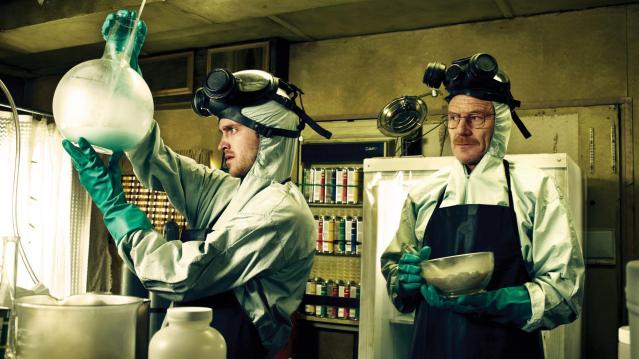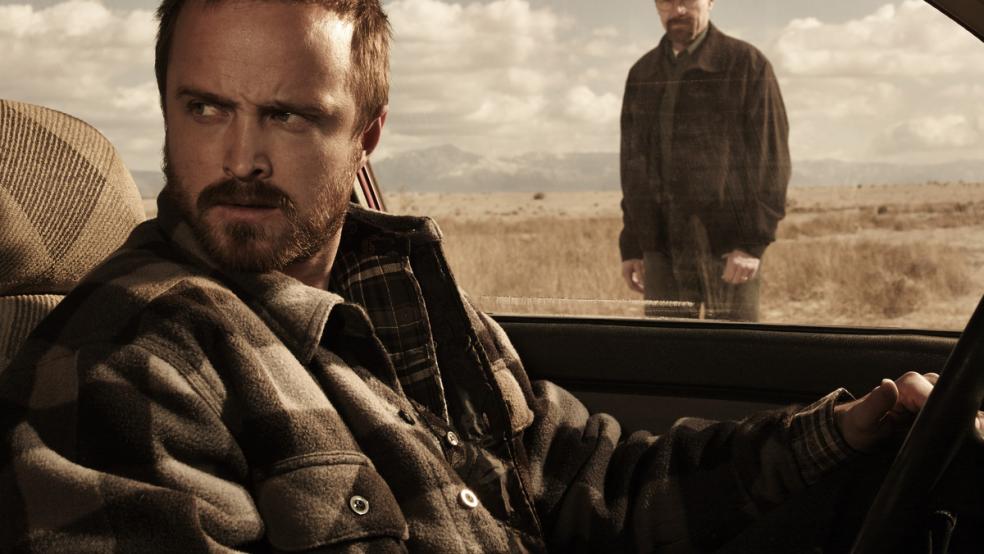Regardless of which fate befalls Walter White come 9:00 p.m. on Sunday night, one clear winner will emerge from the massacre in Albuquerque: the AMC network. Last Sunday’s episode, “Granite State,” finished with a show record 6.6 million viewers despite having stiff competition from the NFL, the Emmy Awards (where the show won Best Drama), and the series of finale of “Dexter.” This follows the record-breaking previous episode, which recorded 6.37 million viewers and the season 5.2 premiere, which scored 5.92 million. AMC reportedly was looking for $300,000 to $400,000 for a 30-second ad spot in the finale.
The show and the network have also clearly benefited from their partnership with Netflix. Season 5.1’s finale, “Gliding Over,” scored a much smaller 2.78 million viewers, but consistently strong reviews and word of mouth persuaded enough people (myself included) to binge watch in the break between half seasons to double that number by the premiere.
This is clearly a big win for series creator and showrunner Vince Gilligan – “the hottest name in television,” as The New York Times just called him. In addition to the just announced police drama “Battle Creek” for CBS, Gilligan is also continuing his relationship with AMC (and the world of "Breaking Bad") with the long rumored Saul Goodman spin-off finally confirmed. But the success if “Breaking Bad” might be an even more important victory for AMC, which has now overtaken HBO as the top purveyor of quality adult dramas.
RELATED: BREAKING BAD: BY THE NUMBERS
During its mid-2000’s heyday, HBO wore the crown, with shows like “The Sopranos,” “The Wire,” “Deadwood,” “Six Feet Under,” and okay, fine, “Sex and the City.” But those shows are long gone, and with the conclusion of “True Blood,” only “Game of Thrones” can still be considered to be at the forefront of the zeitgeist. The less said of the train wreck that is “The Newsroom,” the better.
Showtime has also lost a step now that “Dexter” is out of its lineup. With “Homeland” suffering from a brutal case of Second-Season Syndrome (and a season 3 premiere that’s pitted against Walt’s last stand), there’s little sign of them getting back in the game.
AMC, on the other hand is riding high, on its Emmy and ratings victory for the show, as well as the news that “Mad Men” would also break its final season into two sections, ensuring two more years of being at the front of cultural conversations. Meanwhile AMC’s other smash hit, “The Walking Dead,” can keep shambling along as long as the current zombie fad remains.
It seems an odd development for a channel that was once just a distribution network for old titles, hosted by George Clooney’s dad. It is worth remembering, though, that HBO was once a distribution network for slightly less-old movies before its reinvention as a television channel for adults.
It is also worth noting that while HBO’s tent pole shows were either about dealing with the emotional baggage of mortality (“Sopranos,” “Six Feet Under”) or the world in a microcosm (“The Wire,” “Deadwood”), all of AMC’s biggest shows are fundamentally about work and the way we relate to it in the modern age. “Mad Men” focuses on the dissonance between the person we pretend to be to succeed and the person we really are. “The Walking Dead,” like any post-apocalyptic wish fulfillment fantasy, is about the desire to wipe the slate clean of society’s rules and return to a place where only survival mattered.
“Breaking Bad,” for most of its run, focused on the monster that our jobs force us to become to our families in the “always-on” culture. (“Sorry honey, I can’t make your soccer game tonight, I gotta cook some meth.”) It’s grand irony that Walt alienates the very people he aims to provide for with these difficult choices. Every time he leaps from frying pan to fire, he loses a bit of his soul to escape.

And while Don Draper and the herd of zombies can certainly take a lot of credit for the network’s success, much of the credit should go to Gilligan’s clockwork engine. It may not have the powerful social commentary of “The Wire” or the epic scope of “Game of Thrones,” but “Breaking Bad” has been revealed as a perfect mousetrap.
Many shows over the years have failed in wrapping things up well. The last season of “The Wire” was its weakest. “The Sopranos” still receives complaints for its elliptical ending. “Deadwood” had an ending prematurely forced on it. And we all remember the mess that was the end of “Lost.”
“Breaking Bad,” on the other hand has never slumped. Unless Gilligan totally drops the ball during his last hour, he will have delivered a pulse-pounding and breathless final season with all the relentlessness of the fates in Greek tragedy or Shakespeare.
As always with this show, we the viewers, are asked to question where our sympathies really lie as we approach the finale. The show has always been an exercise in turning your protagonist into a villain. And seeing how far an audience would follow it. What at first could seem like a Robin Hood sort of story, a moonshiner’s tale, turned into something more like Macbeth.
But no matter what either of those men have done to deserve their fates, we want Walt to roll into the White Power compound to rescue Jesse like a one man Wild Bunch. We want Walter to get a Samurai’s death and Jesse to at last have some peace, and the real terror is that the ever-perverse Gilligan may not give us what we want.



